|
Pivotal World Series Moments
Huggins Starts Moore
1927 World Series Game 4: Pittsburgh Pirates @ New York Yankees
The fourth game of the 1927 World Series has a unique distinction that will be revealed at the end of this article.
After edging the Pirates in Game 1, the Yankees took the next two games 6-2 and 8-1.
New York manager Miller Huggins surprised the baseball world by naming right-hander Wilcy Moore as his starter for Game 4. Moore had been a bullpen workhorse for the '27 Yankees, pitching 213 innings with only 12 starts. That was 125 innings more than any other Yankee bullpen hurler. He finished 30 games, earning 13 saves as retroactively computed using today's rules. That earned him "the distinction of becoming the team's first great relief pitcher."
In the first game of the '27 Series, Huggins brought in Moore to replace Waite Hoyt in the eight. Wilcy pitched 1 2/3 scoreless innings to preserve the 5-3 lead.
Moore did all this in his first season with the Yankees after signing a contract in February for $2,500 with the possibility of another $500 if he stayed with the club the entire season.
Wilcy's career took a turn for the better, strangely, after he broke his pitching arm in the minor leagues in 1925. When it healed, he couldn't throw overhand. So he dropped down and threw sidearm, giving the ball a natural sink that caused it to move down and away from lefties and down and in to right-handed batters.
A visiting sportswriter wrote this during the season: "Moore's pitch sinks so rapidly the Yankee catchers have to get closer to the plate to keep from picking the ball from the dirt and to prevent the umpies from misjudging his pitches. Moore's sinker may pass the batter above the knee but drops so fast before the catcher gets it as to be only ankle high." The press dubbed Wilcy "Doc," because, as one writer explained, "he specializes in treating ailing ball games and putting them back in a healthy condition."
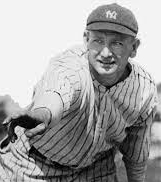 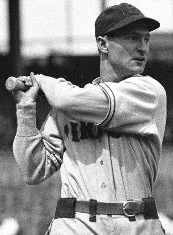 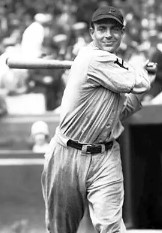 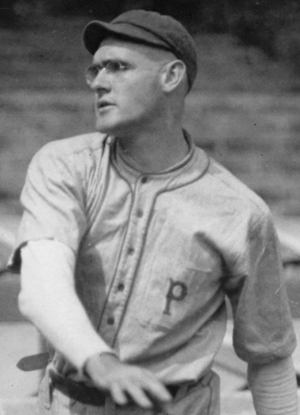 L-R: Wilcy Moore, Lloyd Waner, Glenn Wright, Carmen Hill The Pirates scored a run in the top of the 1st on a single by Lloyd Waner, two groundouts, and a single by Glenn Wright.
The Yankees tied the score in the bottom of the first when the first three batters, Earle Combs, Mark Koenig, and Babe Ruth, singled off 22-game-winner Carmen Hill. The Pirate hurler settled down and struck out the next three batters to keep the score tied.
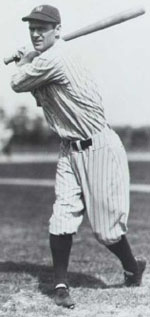 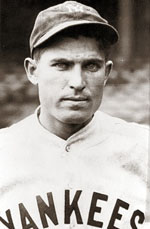 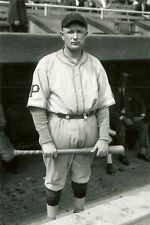 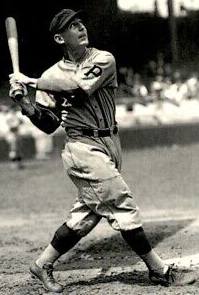 L-R: Earle Combs, Mark Koenig, Earl Smith, Fred Brickell As Moore shut out the Pirates from the 2nd through the 6th inning, the Yankees took the lead in the 5th on Ruth's two-run homer to deep right-center field. It was only the Bronx Bombers' second four-bagger of the Series, both by Ruth.
The Pirates pulled into a tie with two unearned runs in the 7th. Earl Smith reached first when Moore couldn't handle the toss from 1B Lou Gehrig. Then PH Fred Brickell was the beneficiary of a bobble by 2B Tony Lazzeri. Lloyd Waner sacrificed the runners up a base. Clyde Barnhardt singled home PR Emil Yde as Brickell moved to third. Paul Waner's sacrifice fly tied the score at three.
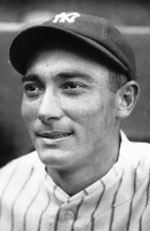 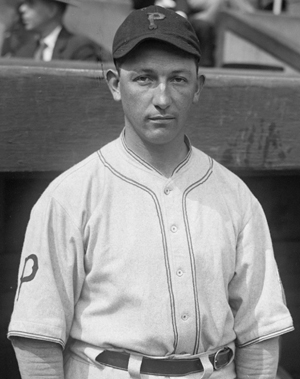 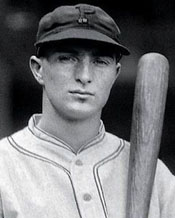  L-R: Tony Lazzeri, Clyde Barnhardt, Paul Waner, Johnny Miljus The game remained tied into the bottom of the 9th. Johnny Miljus, who replaced Hill in the 7th, commited the cardinal sin of walking the leadoff batter, Combs. Koenig then bunted down the third base line and beat the throw to first. After a wild pitch moved the runners to second and third, Pirate manager Donie Bush ordered an intentional walk to Ruth.
The strategy almost worked as Miljus, to the surprise of most fans and reporters, struck out both Gehrig and Meusel. But just when it looked like he might get out of the jam if he retired Lazzeri, the Pirate hurler unleashed a wild pitch, allowing Combs to score the Series-clinching run.
The 1927 World Series remains the only Fall Classic that ended on a wild pitch.
References
"Wilcy Moore," Fred Glueckstein, https://sabr.org/bioproj/person/wilcy-moore/ Great Moments in Baseball: From the World Series of 1903 to the Modern Records of Nolan Ryan, Tom Seaver (1992) Yankees Century: 100 Years of New York Yankees Baseball, Glenn Stout (2002) |